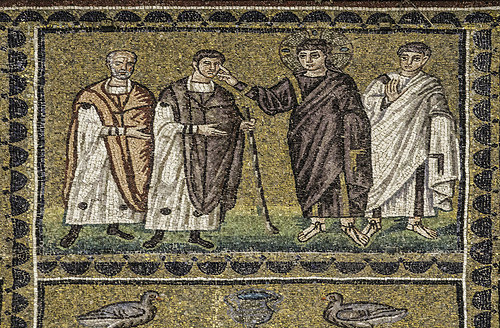We run our website the way we wished the whole internet worked: we provide high quality original content with no ads. We are funded solely by your direct support. Please consider supporting this project.

Does God Still Heal?
In the ancient world Jesus was known first and foremost as an exorcist and a healer. These two activities are mentioned in every summary of Jesus’s ministry found in the Gospels.
It’s common for Western Christians today to accept that infirmities (sickness, disease, injuries, disabilities and deformities) are part of God’s mysterious plan for their life. We may ask God to relieve us and others from physical afflictions, but we also pray for God to help us accept them as part of his mysterious “sovereign plan.”
Jesus and the early church had a different perspective, however. Never once did Jesus or anyone else in the New Testament encourage people to accept their afflictions as coming from God. Instead, they uniformly revolted against afflictions as being the direct or indirect byproducts of Satan’s oppressive regime. They viewed sickness and disease as part of the diabolic curse that afflicts the fallen world and they understood that the kingdom of God is all about reversing the curse. They believed that where God reigns, his original holistic design for the human body would be restored and the physical afflictions that were directly or indirectly brought about by the demonic powers would cease.
For example, Luke describes a woman who was “bent over and could not straighten up at all” as being “crippled by spirit.” When Jesus healed the woman certain religious authorities objected, for it was the Sabbath. But Jesus replied, “should not this woman, a daughter of Abraham, whom Satan has kept down for 18 long years, be set free on the Sabbath day from what bound her?” (Luke 13:11, 16). The woman’s deformed back was the result of a crippling spirit and part of Satan’s oppressive regime.
The central role healing played in Jesus’s ministry as well as the close connection between physical infirmities and demonic activity is succinctly expressed by Peter when he summarizes Jesus’s ministry by saying, “he went around doing good and healing all who were under the power of the devil” (Acts 10:38). Jesus was all about reversing the curse, and this included all forms of physical affliction.
This was the general understanding of the church for the first three centuries. In fact, the early church’s ability to free people from physical afflictions and demonic oppression was one of the strongest tools of evangelism. While healers and exorcists were rather common in the ancient world, it was widely conceded that no one could heal or deliver people as effectively and as consistently as Christians.
Since the job of the church is to manifest everything Jesus manifested and revolt against everything Jesus revolted against, we must accept that manifesting God’s original holistic design for the human body while revolting against the powers that afflict us physically remains a central part of our kingdom mandate. We are called to revolt against physical infirmities as part of Satan’s regime, not accept them as part of God’s mysterious will.
We are called to trust that God can and does continue to heal people today.
Image by Lawrence OP via Flickr
Category: Q&A
Tags: Faith, healing, Sickness, Spiritual Warfare, Warfare Worldview
Topics: Faith & Doubt, The Problem of Evil
Related Reading

Sermon Clip: God In The Gallows
Greg has recently returned from a three week trip in Europe, and today he shares stories of how the Kingdom message of a Jesus-looking God, radical love and non-violence is truly spreading all over the world. You can view the full sermon here: http://whchurch.org/sermons-media/sermon/god-in-the-gallows

Corrective Love
drp via Compfight Kathy Escobar posted the other day about providing “corrective experiences” to those who have been hurt in the past. How many of us have approached Christians with our wounds and have been offered more of the same instead of the love and acceptance we’re longing for? How beautiful it would be if…

Some Questions a Year After Her Child’s Death
Jessica Kelley wrote a post for The Jesus Event that we wanted to share with you. You might remember that last year we were getting to know Jessica as she lost her four year old son Henry just before Christmas. In this post, she reflects on the theology of the people around her concerning her son’s death. She has…

The God Who Embraces Our Doubt
Lawrence OP via Compfight Zack Hunt over at The American Jesus posted some of his thoughts on doubt, and it seemed fitting on this week before the Doubt, Faith & the Idol of Certainty conference to share what he had to say. We’re thinking he must have stumbled on Greg’s book or maybe God is…

If Creation is Created in the Middle of Cosmic Warfare, How Can God Call It All Good?
In this episode Greg discusses creation, in the context of cosmic warfare, and considers how God could call it “good.” Links: Greg’s book: “God at War“ http://traffic.libsyn.com/askgregboyd/Episode_0022.mp3

The Suffering of God
NYC.andre via Compfight This seems like a good follow-up post from what Greg posted yesterday. Charisma posted this reflection on the problem of evil and the suffering of God. It’s a great summary of our thinking about what accounts for the kind of world we see where tragedies like Newtown occur. From the article: C.…
